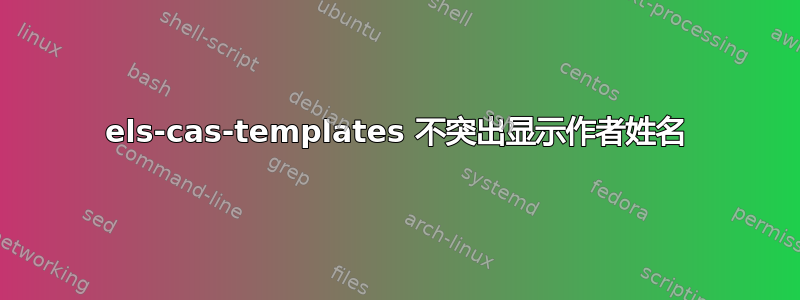
我一直在使用els-cas-模板Elsevier 的 LaTeX 软件包。我将向 Elsevier 期刊提交论文,允许提交此官方包。我没有动过任何模板文件,也不想动。我正在编辑/构建背页。我正在使用cas一dc(双栏)格式,因为它最类似于我要提交的期刊。
我已经看过文档,我不知道如何关闭作者姓名的突出显示。可以吗?我提交的期刊(太阳能)没有突出显示作者姓名。
虽然我认为提供以下示例文件代码实际上没有什么用(因为 CTAN 模板显然有一个执行此操作的文件),但我提供此代码作为tex包含其cas-dc.cls文件的“精简”主文件的示例,因为它是在评论中请求的:
\documentclass[a4paper,fleqn]{cas-dc}
\usepackage[authoryear]{natbib}
\usepackage{gensymb}
\usepackage{lipsum}
\bibliographystyle{cas-model2-names}
\begin{document}
\let\WriteBookmarks\relax
\def\floatpagepagefraction{1}
\def\textpagefraction{.001}
\shorttitle{Short title}
\shortauthors{J. Smith et~al.}
\title [mode = title]{Here is a title}
\author[1]{John Smith}
\cormark[1]
\ead{[email protected]}
\author[2]{John Doe}
\address[1]{School A}
\address[2]{School B}
\cortext[cor1]{Corresponding author.}
\begin{abstract}
\lipsum[1]
\end{abstract}
\begin{keywords}
some \sep keywords \sep here
\end{keywords}
\maketitle
\lipsum[1-10]
\bibliography{refs}
\end{document}
我还有一个问题关于此模板 (ORCIDs),如果可能的话,我想在不触碰模板代码的情况下修复它。我给软件包作者发了电子邮件,但没有得到任何官方支持。我宁愿不改变他们的提交模板。
答案1
一个简单的解决方案是将作者姓名明确设置为黑色。
梅威瑟:
\documentclass[a4paper,fleqn,draft]{cas-dc}
\usepackage[authoryear]{natbib}
\usepackage{gensymb}
\usepackage{xpatch}
\usepackage{lipsum}
\bibliographystyle{cas-model2-names}
\begin{document}
\let\WriteBookmarks\relax
\def\floatpagepagefraction{1}
\def\textpagefraction{.001}
\shorttitle{Short title}
\shortauthors{J. Smith et~al.}
\title [mode = title]{Here is a title}
\author[1]{\color{black}John Smith}
\cormark[1]
\ead{[email protected]}
\author[2]{\color{black}John Doe}
\address[1]{School A}
\address[2]{School B}
\cortext[cor1]{Corresponding author.}
\begin{abstract}
\lipsum[1]
\end{abstract}
\begin{keywords}
some \sep keywords \sep here
\end{keywords}
\maketitle
\end{document}
结果:
一个更复杂的解决方案(但从概念上来说可能更好)是\author从主文档中重新定义宏。不幸的是,宏相当长,因此这会占用文档中的空间(我尝试了一种xpatch解决方案,但无法使它工作)。作者的名字是用彩色打印的\l_stm_augroup_color_tl !50,因此默认黑色的 50%(呈现为灰色)。将其更改为只会\l_stm_augroup_color_tl将名字呈现为黑色。
代码:
\documentclass[a4paper,fleqn,draft]{cas-dc}
\usepackage[authoryear]{natbib}
\usepackage{gensymb}
\usepackage{xpatch}
\usepackage{lipsum}
\makeatletter
\ExplSyntaxOn
\RenewDocumentCommand \author { O{} m O{} }
{
\ResetMarks
\tl_if_blank:nTF { #3 } { }
{ \keys_set:nn { stm / author } { #3 } }
%
\int_gincr:N \g_stm_au_int
\tex_gdef:D \theau@ { \int_use:N \g_stm_au_int }
%
\seq_gput_right:Nn \g_stm_prelimsau_seq { #2 }
\bool_if:NTF \l_stm_au_collab_bool
{ \seq_gput_right:cn { g_stm_clau\int_use:N \g_stm_augr_int _seq } }
{ \seq_gput_right:cn { g_stm_au\int_use:N \g_stm_augr_int _seq } }
{
\int_gincr:N \g_stm_aau_int
\tex_gdef:D \theauthor {\int_use:N \g_stm_aau_int }
\keys_set:nn { stm /author } { #3 }
\tl_if_head_eq_catcode:nNTF { #1 } a
{ \processAffRef { #1 } }
{ \processAffNum { #1 } }
\tl_if_empty:NF \l_stm_au_prefix
{ \l_stm_au_prefix_tl \c_space_token }
\str_if_eq:VnTF \l_stm_au_style_tl { chinese }
{ %\msg_term:n {STYLE~T=\l_stm_au_style_tl........}
\invparsename { #2 }
\textcolor{\l_stm_augroup_color_tl}{\surname}
\no_break_space:
\textcolor{\l_stm_augroup_color_tl}{\firstname} %%% CHANGE HERE
}
{ %\msg_term:n {STYLE~F=\l_stm_au_style_tl........}
\parsename { #2 }
\textcolor{\l_stm_augroup_color_tl}{\firstname} %%% AND HERE
\no_break_space:
\textcolor{\l_stm_augroup_color_tl}{\surname}
}
\tl_if_empty:NF \l_stm_au_suffix_tl
{ \c_space_token \l_stm_au_suffix_tl }
\unskip
\textsuperscript
{
\tl_if_blank:nTF { #1 }
{ \tex_def:D \sep{} }
{ {\itshape\listAff} \tex_def:D \sep{\unskip,} }
\process@marks
\bool_if:NT \l_stm_au_deceased_bool
{ \sep \maltese
\tex_def:D \sep { \unksip, }
}
}
\tl_if_empty:NF \l_stm_au_degree_tl
{ ,\c_space_token \l_stm_au_degree_tl }
\tl_if_empty:NF \l_stm_au_role_tl
{ \c_space_token (\l_stm_au_role_tl) }
%
\ResetMarks
}
%
\bool_if:NT \l_stm_au_deceased_bool
{
\seq_gput_right:Nn \g_stm_maltese_seq
{
\tex_def:D \thefootnote { \maltese }
\footnotetext{Deceased~author.}
}
}
% various social media
\tl_if_empty:NTF \l_stm_au_facebook_tl { }
{
\wrAux { \token_to_str:N \facebookauthor
{ \l_stm_au_facebook_tl } { \exp_not:n {#2} } }
}
\tl_if_empty:NF \l_stm_au_twitter_tl
{
\wrAux { \token_to_str:N \twitterauthor
{ \l_stm_au_twitter_tl } { \exp_not:n {#2} } }
}
\tl_if_empty:NF \l_stm_au_gplus_tl
{
\wrAux { \token_to_str:N \gplusauthor
{ \l_stm_au_gplus_tl } { \exp_not:n {#2} } }
}
\tl_if_empty:NF \l_stm_au_linkedin_tl
{
\wrAux { \token_to_str:N \linkedinauthor
{ \l_stm_au_linkedin_tl } { \exp_not:n {#2} } }
}
\tl_if_empty:NF \l_stm_au_orcid_tl
{
\wrAux { \token_to_str:N \orcidauthor
{ \l_stm_au_orcid_tl } { \exp_not:n {#2} } }
}
%
\@eadauthor={#2}
\pdfstringdef\__info_au: { #2 }
\int_compare:nNnTF { \theau@ } < { 4 }
{ \xappto \infoauthors { \__info_au: , ~ } }
{
\int_compare:nNnTF { \theau@ } = { 4 }
{ \xappto \infoauthors { et~al. } }
{ }
}
}
\ExplSyntaxOff
\makeatother
\bibliographystyle{cas-model2-names}
\begin{document}
\let\WriteBookmarks\relax
\def\floatpagepagefraction{1}
\def\textpagefraction{.001}
\shorttitle{Short title}
\shortauthors{J. Smith et~al.}
\title [mode = title]{Here is a title}
\author[1]{John Smith}
\cormark[1]
\ead{[email protected]}
\author[2]{John Doe}
\address[1]{School A}
\address[2]{School B}
\cortext[cor1]{Corresponding author.}
\begin{abstract}
\lipsum[1]
\end{abstract}
\begin{keywords}
some \sep keywords \sep here
\end{keywords}
\maketitle
\end{document}



